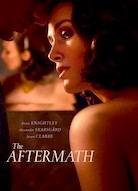Please welcome guest contributor J.B.
 When I saw The Aftermath, the latest from Testament of Youth director James Kent, starring Kiera Knightley, Jason Clarke and Alexander Skarsgård, last weekend, I was seated next to an older man with a notepad who I assumed was a journalist. I chatted briefly with him before the film started, and when the lights went up and the credits began to roll, I asked him what he thought. His response: “I interviewed her [Knightley] when she did Atonement with James McAvoy. She was so good in that.”
When I saw The Aftermath, the latest from Testament of Youth director James Kent, starring Kiera Knightley, Jason Clarke and Alexander Skarsgård, last weekend, I was seated next to an older man with a notepad who I assumed was a journalist. I chatted briefly with him before the film started, and when the lights went up and the credits began to roll, I asked him what he thought. His response: “I interviewed her [Knightley] when she did Atonement with James McAvoy. She was so good in that.”
That's a pretty fair takeaway from The Aftermath, which casts Knightley as Rachel, a bereaved military wife recently arrived in Hamburg in 1946 to join her estranged husband, Lewis (Jason Clarke), an officer in the British Army tasked with overseeing the rebuilding of the war-torn city and ferreting out any remaining Nazi-sympathizers...

In Hamburg, Rachel begins an affair with Stefan (Skarsgård), a German architect (and maybe Nazi?), whose home has been requisitioned by the British government for use by Lewis and Rachel while they are stationed there.
The film is, almost aggressively, fine. Very safe, subdued, by-the-book period fare. It's well-shot and well-acted but provides little to chew on and is likely to leave many viewers feeling cold. Based on the book of the same name by Rhidian Brook, The Aftermath suffers from a rote, poorly-paced script which under-develops its characters and never lets the audience close enough to really feel the emotional anguish and passion we observe them experiencing, or to make us care about it, or at times, even believe it.
The film’s main problem, though, is that it just doesn’t tread enough (i.e. any) new ground to make it memorable. Knightley, Clarke and Skarsgård have all played versions of their Aftermath characters before in better vehicles, and Kent isn’t saying anything with this film we haven’t heard him, or, for that matter, any number of other directors who have helmed elegant war dramas, say before.
Knightley, in particular, frequently gets labeled a one-trick pony for playing the same kind of character in the same kind of film repeatedly and The Aftermath does nothing to disprove that thesis among her naysayers. I personally don’t hold this against her—she has spoken previously about the fact that she is drawn to period drama because it is just about the only genre that consistently puts women’s stories at the forefront of the narrative, so why not return to this genre frequently? And just about no one in the game today brings as much vigor, wit and vulnerability to period roles as she does. Sometimes that works out in her favor, and can help elevate good films to better films (like last year’s Collette). But other times, it doesn’t, as in The Aftermath, which falls flat irrespective of her performance, but is made perhaps even less compelling by the fact that we’ve seen her to do everything she’s doing here a number of times before, with more interesting material to work with and with co-stars with whom she has had more chemistry.

The Aftermath is not a bad movie. As a die-hard period drama lover, I enjoyed it, as will you if you're similarly inclined. It’s just not a movie anyone will remember 10 years from now, the way my movie neighbor (and many others) fondly recall Atonement, which bears a lot of similarities to The Aftermath (including a teenage villainess out to destroy poor Kiera’s happiness) but does everything better. Then again, perhaps that’s an unfair comparison. It's unlikely that anyone will be able to replicate the magic of Atonement's green dress and pint-sized Saoirse Ronan's breakthrough, but who would want to dissuade James Kent, or anyone else, from trying?